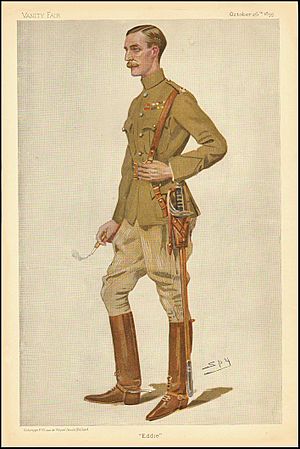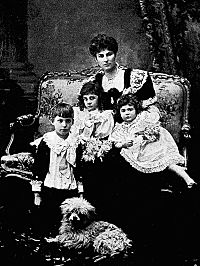Edward Montagu-Stuart-Wortley facts for kids
Quick facts for kids
Edward James Montagu-Stuart-Wortley
|
|
|---|---|

"Eddie". Caricature by Spy published in Vanity Fair in 1899.
|
|
| Nickname(s) | Eddie |
| Born | 31 July 1857 London, England |
| Died | 19 March 1934 (aged 76) |
| Allegiance | |
| Service/ |
|
| Years of service | 1877–1919 |
| Rank | Major General |
| Unit | King's Royal Rifle Corps |
| Commands held | 46th (North Midland) Division |
| Battles/wars | Second Anglo–Afghan War First Boer War Anglo-Egyptian War (1882) Mahdist War Second Boer War First World War |
| Awards | Companion of the Order of the Bath Companion of the Order of St Michael and St George Distinguished Service Order Member of the Royal Victorian Order |
Major General Edward James Montagu-Stuart-Wortley (born 31 July 1857 – died 19 March 1934) was a very important officer in the British Army. He served in many places around the world, like Afghanistan, South Africa, Egypt, Turkey, Malta, Sudan, France and Ireland. He was involved in a famous event called the "Daily Telegraph'' Affair". This event, based on an "interview" he had with Kaiser Wilhelm II of Germany, actually made the Kaiser less powerful. During the First World War, he was removed from his command after the Battle of the Somme. This happened because his division's attack, which was meant to distract the enemy, did not succeed.
Contents
Early Life and Military Start
Edward Wortley was born in London on 31 July 1857. He was the second son in his family. He went to Eton College, a famous school, starting in 1866. After school, he joined the King's Royal Rifle Corps as an officer on 13 October 1877.
Serving in Imperial Wars
Edward Montagu-Stuart-Wortley had a long career in the army, serving in many conflicts.
Early Campaigns
He worked as the main person for army signals during the Second Anglo–Afghan War from 1878 to 1880. When the First Boer War began in South Africa in 1880, he joined the Natal Field Force. He fought in important battles like Laing's Nek and Majuba Hill.
In 1881, he was a military helper to General Valentine Baker in Egypt. Then, during the Anglo-Egyptian War in 1882, he was an aide-de-camp (a personal assistant) to Major General Sir Evelyn Wood.
Nile Expedition and Sudan
From 1884 to 1885, he joined the Nile Expedition. This mission tried to rescue General Gordon who was trapped in Khartoum. Wortley fought in the Battle of Abu Klea on 17 January 1885. Later in 1885, he went to Constantinople (now Istanbul) as a military expert with a politician named Sir Henry Drummond Wolff. He also served as a senior assistant to Sir Francis Grenfell at the Battle of Ginnis.
After studying at the Staff College, Camberley in 1889, he became a brigade major in Malta from 1893 to 1896. He was promoted to major in 1894. He received an award, the Companion of the Order of St Michael and St George (CMG), in 1896.
He then joined Lord Kitchener's second campaign in Sudan starting in 1896. Wortley was second-in-command of a group of gunboats. He also led a group of Arab fighters who helped secure the east side of the Nile River during the battle of Omdurman. For his bravery, he received the Distinguished Service Order (DSO) in November 1898.
Second Boer War and Diplomatic Role
During the Second Boer War, Wortley led a special battalion of rifle soldiers. He helped in the Relief of Ladysmith after the Battle of the Tugela Heights. In 1901, he became a lieutenant-colonel. He was then sent to Paris to be a military attaché, which meant he was a military expert working at the British embassy there for three years.
The Daily Telegraph Affair
In 1907, Kaiser Wilhelm II of Germany rented Wortley's home, Highcliffe Castle, while he was recovering from an illness. As a thank you, the Kaiser gave Wortley two stained glass windows for his castle. He also invited Wortley to watch the German Army's training exercises in Alsace the next year.
During these visits, Wortley had several talks with the Kaiser. The Kaiser told him that he wanted good relations with Britain. Wortley believed the Kaiser and thought that if people in Britain knew this, it would help stop the growing anti-German feelings. So, in September 1908, he wrote down his notes from their conversations and gave them to a journalist from The Daily Telegraph newspaper.
The Kaiser's staff were supposed to check the notes before they were published, but they didn't do it properly. When the notes were published as an "interview" with the Kaiser, it caused a huge scandal called the "Daily Telegraph'' Affair". The British public was very angry, and the event made the Kaiser much less powerful in Germany.
From 1908 to 1912, Stuart-Wortley commanded the 10th Infantry Brigade.
First World War Service
On 1 June 1914, at the start of the First World War, Major General Montagu-Stuart-Wortley became the commander of the 46th (North Midland) Division. This was a Territorial Force (volunteer army) division.
Battle of Loos
In October 1915, his division fought in France during the Battle of Loos. They made a very costly attack on a German position called the Hohenzollern Redoubt. Wortley wanted to use a different, safer attack plan, but his commander, General Richard Haking, ordered a direct frontal attack. This attack was a disaster. The division lost many soldiers: 180 officers and 3,583 men were killed, wounded, or went missing. Historians later called this action a "tragic waste of infantry."
Even though Wortley was known for being a good trainer of troops, his division's poor performance and high losses at Hohenzollern Redoubt and later at Gommecourt led to him being blamed. Some historians argue that he was unfairly made a scapegoat for the failures. Wortley had suggested a more careful, step-by-step attack, which was a smart tactic given his limited resources. He also learned from the battle, writing down 22 important tactical points to improve future actions.
After the attack, there were many accusations against the commanders. One Member of Parliament, Josiah Wedgwood, wrote to the Prime Minister, saying that a new general was needed to improve morale. The Prime Minister sent the letter to General Haig, who blamed the 46th Division's soldiers for not fighting well and lacking courage. Haig also blamed Stuart-Wortley, saying there was "want of discipline" in the division. However, some historians believe Haig's criticism was unfair and based on weak evidence. They argue that the soldiers did advance and fought bravely, but faced very strong German defenses.
General Haig did not think highly of Stuart-Wortley as a division commander. It's thought that Wortley's careful approach, suggesting limited attacks, might have been seen as not having enough "offensive spirit" by higher commanders. Some historians believe Wortley was caught up in bigger power struggles within the British Army.
Wortley also upset Haig by writing directly to King George V about his division's activities, even though he had permission from Sir John French to do so. This, along with the disagreement about the Hohenzollern Redoubt attack, made Wortley a "marked man" in Haig's eyes. By the time of the Somme battle, Wortley was almost 59 and not in good health, suffering from pain in his leg (sciatica). Some thought he was "past his fighting best" and not fit to lead in battle. One officer described him in 1916 as "a worn-out man, who never visited his front line."
Battle of the Somme: Gommecourt
On 1 July 1916, the first day of the Battle of the Somme, Wortley's 46th Division was part of a distraction attack at Gommecourt. The attack started at 7:30 AM but failed quickly, with many soldiers killed or wounded by enemy fire. Most of the troops got stuck in their own trenches.
Montagu-Stuart-Wortley was ordered to attack again at midday. The neighboring 56th Division was doing well but needed support. However, the 46th Division was in chaos and could not attack properly. After many failed attempts to restart the attack, Wortley knew it wouldn't work. But at 3:30 PM, under pressure from his commanders, he ordered a small effort. Only one platoon (a small group) of 20 men went over the top, and only 2 survived.
That evening, the 56th Division had to retreat after fighting alone for 13 hours. The 46th Division's attack had completely failed. It also had the lowest number of casualties (2,455 killed, wounded, and missing) among the 13 British divisions fighting that day. The 46th Division was blamed for the failure at Gommecourt, as they left the 56th Division to fight alone. This gave them a bad reputation for being a poor fighting unit, which lasted until their great victory in 1918.
After the attack, Lieutenant-General Thomas D'Oyly Snow said that the 46th Division "showed a lack of offensive spirit." He believed this was because Wortley was too old and not strong enough to be with his men in the front lines. General Snow ordered an investigation into the 46th Division's actions. But before the investigation finished, General Haig ordered Montagu-Stuart-Wortley to leave the battlefield and return to England.
Wortley's dismissal is still debated. Some argue that he and his division were made scapegoats for a plan that was flawed from the start.
Later Life and Family
After returning home, Edward Wortley was given a less important command in Ireland until March 1919. He retired from the British Army on 31 July 1919. After the war, he protested to the government many times, feeling that he had been treated unfairly. He believed he should have received the usual honors given to commanders of his rank, but he never did. He passed away on 19 March 1934, at the age of 76.
Personal Life
Edward married Violet Hunter Guthrie on 5 February 1891. They had three children:
- Nicholas Rothesay Stuart-Wortley (1892–1926)
- Louise Violet Beatrice Montagu-Stuart-Wortley (1893-1970)
- Elizabeth Valetta Montagu-Stuart-Wortley (1896–1978)
Edward's older brother, Sir Francis Montagu-Stuart-Wortley-Mackenzie, became the Earl of Wharncliffe. His younger brother, Sir Alan Richard Montagu-Stuart-Wortley, also became a lieutenant-general in the British Army and served throughout the First World War.
Images for kids
 | Aaron Henry |
 | T. R. M. Howard |
 | Jesse Jackson |




